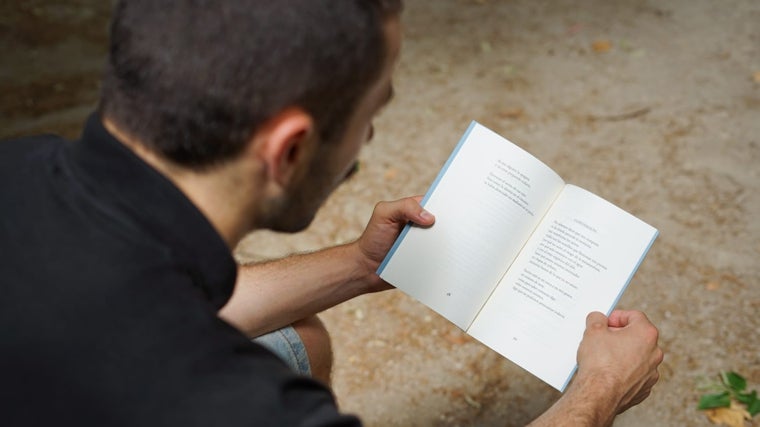Nicolás Mateos Früchbek, poet: "I am in favor of creating science fiction with poetry."

Hundreds and hundreds of poetry collections are published in Spain every year. Most are bad, others not so much, but every now and then there are writers who surprise with their work. Young voices worth reading because they write the poetry of their time with works that stand on their own, regardless of the prize that endorses them. The Spanish-German poet and PhD in Hispanic Studies, Nicolás Mateos Früchbek (Madrid, 1997), could fit into this latter category. Last May, he won the 40th Hiperión Poetry Prize for his poetry collection "Tránsil." A groundbreaking, unique book with great references to the classics, amidst a young Spanish poetry scene that tends to revolve around the same worn-out themes.
Mateos Früchbek arrives at the meeting on time, smiles, and to break the ice, admits he's a little nervous because it's his first interview. He specialized in Golden Age prose, especially autobiographies. "One amazing thing about 16th and 17th century autobiographies is that most of them were written by soldiers and nuns who were going to war," he explains enthusiastically after having defended his doctorate a few days earlier. He confesses that the best military autobiographies are 'El discurso de mi vida' (The Speech of My Life), by Alonso de Contreras , who was practically a thug, and Catalina de Erauso, who donned a man's habit and went to Chile.
In the field of poetry, thanks to his great-uncle, the award-winning Orchestra Conductor Rafael Früchbek de Burgos , his ear is very attuned to the rhythm of verse. His relationship with poetry began at the age of 17, a moment of adolescent exaltation, reading Neruda and the Generation of '27 , and trying to imitate them. However, his arrival at university completely consolidated his relationship with the poetic and academic word.

'Tránsil' is his first collection of poems, and submitting it to the Hiperión was "the last chance I was giving the work." It combines his two great passions: science fiction and the Golden Age. "I thought it was an original idea to merge them through poetry, because the Golden Age encompasses that whole aspect of the baroque construction of life as theater or reverie," he explains to our newspaper. He also believes that in those centuries, there was a socially rooted belief in magic, creating a direct point of contact with science fiction, bridging the historical gap.
A total of 37 poems, divided into two parts, "Landscape" and "Society," make up a well-structured book. "Written on the back of my neck and in my gestures / my serial number, / as if to know something / about ourselves," he writes in "Conversion," referring to Garcilaso's renowned sonnet, but in the role of a robot. "A true poet must know the tradition of his own language. You have to read Garcilaso , Lope , and the bare minimum to understand the culture of the language you're speaking. It seems that complexities are somewhat left aside these days," he emphasizes.
The poet explains that 'Tránsil' is "a fictional city , the space where the collection of poems takes place, in which a nuclear war is sensed." The space of science reaches its maximum apogee and the human being reaches a practically insurmountable point of scientific animal: "I have tried to make the consequence of all that technology and evolution touch apocalyptic limits and the title plays with the phonetic similarity of 'Trantor' (a fictional planet in Asimov's novels) and 'Transit' which refers to Latin as something passable."
Regarding literary genres, he emphasizes that he doesn't believe "all poetry is fiction, but rather that science fiction is created with poetry." He adds that we rarely link the two literary perspectives, but that they all lead us to the same thing: human lessons. In his poems, we find children of trilobites, androids , cosmic fissures , and robotic laws. "In 'Landscape' is the most imaginative part and the true construction of 'Tránsil,'" he confesses, clarifying that it was the one he most enjoyed writing, as opposed to 'Society,' which is more personal, intimate, and introspective.
 The young poet reading one of his poems
Pablo dry
The young poet reading one of his poems
Pablo dry
His poetry collection also contains a space for human pessimism and the love that reaches the inhabitants of 'Tránsil' (Remedia Amoris) despite the science fiction. "I used the clichés of the Golden Age, brought from the Greco-Roman tradition. The beauty of this resource is its universality; it can speak to any era and be used in a fictional world created through poetry," he concludes, emphasizing that he doesn't rule out the possibility of this leading to a possible poetic-fictional saga with references to the Golden Age. A profound and atypical work from an author worth following and reading.
abc

%3Aformat(jpg)%3Aquality(99)%3Awatermark(f.elconfidencial.com%2Ffile%2Fbae%2Feea%2Ffde%2Fbaeeeafde1b3229287b0c008f7602058.png%2C0%2C275%2C1)%2Ff.elconfidencial.com%2Foriginal%2F2ad%2F81e%2F2a6%2F2ad81e2a6618015f47de0726d3411f2f.jpg&w=1280&q=100)



